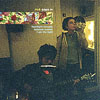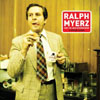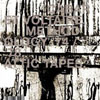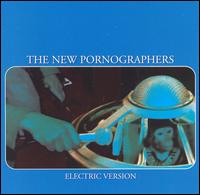Drag City
 Dave Pajo has been quite busy lately as a member of Zwan. To make timefor his own project, Papa M, he's taken to writing and recording invarious cities while on tour and releasing the end result as acollection of CD singles: something he refers to as an audio tourdiary. Disc one in this series is comprised of three tracks recorded inChicago, Bloomington, and Pajo's hometown of Louisville. The relaxedpickin' feel of "Flashlight Tornado" comes off with somewhat of aback-to-basics, coffeehouse approach of acoustic guitar, voice andharmonica. The beautifully re-worked "Beloved Woman" (originally from2002's Whatever, Mortal)opens with a near-violent layering of cello and violin which then dronethroughout the tune's progressions with a eerie seductiveness thatbrings gooseflesh. In keeping with the Songs of Mac EP, Pajocloses out with his arrangement of another writer's song. The ReverendGary Davis' "I Am the Light of This World" is a laid back, minor-keystrummy guitar number augmented with sitar sounds and minimal keyboardwith religious imagery that Pajo conveys very convincingly. As it'salways a pleasure to hear Papa M, hearing the stripped down, bare bonestake on these tunes is all the more special as the focus is more on thesolo artist instead of the full group effort.
Dave Pajo has been quite busy lately as a member of Zwan. To make timefor his own project, Papa M, he's taken to writing and recording invarious cities while on tour and releasing the end result as acollection of CD singles: something he refers to as an audio tourdiary. Disc one in this series is comprised of three tracks recorded inChicago, Bloomington, and Pajo's hometown of Louisville. The relaxedpickin' feel of "Flashlight Tornado" comes off with somewhat of aback-to-basics, coffeehouse approach of acoustic guitar, voice andharmonica. The beautifully re-worked "Beloved Woman" (originally from2002's Whatever, Mortal)opens with a near-violent layering of cello and violin which then dronethroughout the tune's progressions with a eerie seductiveness thatbrings gooseflesh. In keeping with the Songs of Mac EP, Pajocloses out with his arrangement of another writer's song. The ReverendGary Davis' "I Am the Light of This World" is a laid back, minor-keystrummy guitar number augmented with sitar sounds and minimal keyboardwith religious imagery that Pajo conveys very convincingly. As it'salways a pleasure to hear Papa M, hearing the stripped down, bare bonestake on these tunes is all the more special as the focus is more on thesolo artist instead of the full group effort.
 Dave Pajo has been quite busy lately as a member of Zwan. To make timefor his own project, Papa M, he's taken to writing and recording invarious cities while on tour and releasing the end result as acollection of CD singles: something he refers to as an audio tourdiary. Disc one in this series is comprised of three tracks recorded inChicago, Bloomington, and Pajo's hometown of Louisville. The relaxedpickin' feel of "Flashlight Tornado" comes off with somewhat of aback-to-basics, coffeehouse approach of acoustic guitar, voice andharmonica. The beautifully re-worked "Beloved Woman" (originally from2002's Whatever, Mortal)opens with a near-violent layering of cello and violin which then dronethroughout the tune's progressions with a eerie seductiveness thatbrings gooseflesh. In keeping with the Songs of Mac EP, Pajocloses out with his arrangement of another writer's song. The ReverendGary Davis' "I Am the Light of This World" is a laid back, minor-keystrummy guitar number augmented with sitar sounds and minimal keyboardwith religious imagery that Pajo conveys very convincingly. As it'salways a pleasure to hear Papa M, hearing the stripped down, bare bonestake on these tunes is all the more special as the focus is more on thesolo artist instead of the full group effort.
Dave Pajo has been quite busy lately as a member of Zwan. To make timefor his own project, Papa M, he's taken to writing and recording invarious cities while on tour and releasing the end result as acollection of CD singles: something he refers to as an audio tourdiary. Disc one in this series is comprised of three tracks recorded inChicago, Bloomington, and Pajo's hometown of Louisville. The relaxedpickin' feel of "Flashlight Tornado" comes off with somewhat of aback-to-basics, coffeehouse approach of acoustic guitar, voice andharmonica. The beautifully re-worked "Beloved Woman" (originally from2002's Whatever, Mortal)opens with a near-violent layering of cello and violin which then dronethroughout the tune's progressions with a eerie seductiveness thatbrings gooseflesh. In keeping with the Songs of Mac EP, Pajocloses out with his arrangement of another writer's song. The ReverendGary Davis' "I Am the Light of This World" is a laid back, minor-keystrummy guitar number augmented with sitar sounds and minimal keyboardwith religious imagery that Pajo conveys very convincingly. As it'salways a pleasure to hear Papa M, hearing the stripped down, bare bonestake on these tunes is all the more special as the focus is more on thesolo artist instead of the full group effort.


 Despite their unwieldy name which suggests a rather sizeable ensemble,this Norwegian group is in actuality a trio comprised of DJ ErlendSellevold (aka Ralph Myerz) and his cohorts Tarjei Strom and ThomasLonnheim. This, their debut full-length, which is heavily influenced by'60s and '70s film scores, has already placed the band high on thecharts in their native land. In fact, Ralph Myerz & Co. borrowedparts of their moniker from sleazemaster Russ Meyer and his cameraman,Jack Herren, as a result of their fixation upon the soundtracks forMeyers' films when the group initially came together.
Despite their unwieldy name which suggests a rather sizeable ensemble,this Norwegian group is in actuality a trio comprised of DJ ErlendSellevold (aka Ralph Myerz) and his cohorts Tarjei Strom and ThomasLonnheim. This, their debut full-length, which is heavily influenced by'60s and '70s film scores, has already placed the band high on thecharts in their native land. In fact, Ralph Myerz & Co. borrowedparts of their moniker from sleazemaster Russ Meyer and his cameraman,Jack Herren, as a result of their fixation upon the soundtracks forMeyers' films when the group initially came together. Few truly solo artists can produce an album with this kind of majesty.The last time we heard from Mull Historical Society was 2001's Loss,a carefully planned work and worthwhile listen, but featuring a bit toomuch extraneous nonsense. Two years later, founding member Alan Malloyhas departed, leaving Colin MacIntyre to act on his own. Since theywere his songs to begin with—Mull Historical Society has always workedfrom MacIntyre's extensive backlog of already-written songs—it seemslike this shouldn't be that big a deal. Seeing the immense failure ofother solo artist projects where other band members have departed tellsotherwise. He could just as easily screw it all up instead of making animpressive record. Thankfully, here he manages the latter, as Usis my front-runner for album of the year at this point. Wonderful useof strings, piano, and bright guitars intermingle under MacIntyre'sdecidedly goofy voice, as he gives it all in these songs, playing outhis emotions with no strings attached. Everything tends to brisklyshuffle or jangle along with a great mix of instruments and subjectmatter. When things do slow down a bit, like on "Asylum," there's stilla bright edge that could very well be a train at the other end of thetunnel. I didn't care, though, as long as it sounds this good, thiscomplete. The album is great from conception to execution, even whenMacIntyre shows off his trademark odd sense of humor on tracks like"The Supermarket Strikes Back." This is a transition point, where anartist makes or breaks themselves based upon past experience, and MHSblows right past it without a care in the world. I could listen to tenrecords of this and still not get enough.
Few truly solo artists can produce an album with this kind of majesty.The last time we heard from Mull Historical Society was 2001's Loss,a carefully planned work and worthwhile listen, but featuring a bit toomuch extraneous nonsense. Two years later, founding member Alan Malloyhas departed, leaving Colin MacIntyre to act on his own. Since theywere his songs to begin with—Mull Historical Society has always workedfrom MacIntyre's extensive backlog of already-written songs—it seemslike this shouldn't be that big a deal. Seeing the immense failure ofother solo artist projects where other band members have departed tellsotherwise. He could just as easily screw it all up instead of making animpressive record. Thankfully, here he manages the latter, as Usis my front-runner for album of the year at this point. Wonderful useof strings, piano, and bright guitars intermingle under MacIntyre'sdecidedly goofy voice, as he gives it all in these songs, playing outhis emotions with no strings attached. Everything tends to brisklyshuffle or jangle along with a great mix of instruments and subjectmatter. When things do slow down a bit, like on "Asylum," there's stilla bright edge that could very well be a train at the other end of thetunnel. I didn't care, though, as long as it sounds this good, thiscomplete. The album is great from conception to execution, even whenMacIntyre shows off his trademark odd sense of humor on tracks like"The Supermarket Strikes Back." This is a transition point, where anartist makes or breaks themselves based upon past experience, and MHSblows right past it without a care in the world. I could listen to tenrecords of this and still not get enough.  For Cabs collectors and fans of their Industrial Records-era music,this collection is a dream come true. Three CDs of unreleased songs andearly versions are compiled at a surprisingly cheap cost. From theearliest material on the first disc, the sound quality is amazinglyclear. Songs here run the gamut from fully realized tunes to plenty ofhalf-assed noodling. At no point, however, even for the most minimalnoodlings, is it ever dull. This -is- entertainment. (Especially thewalking jazz tune "The Single," where lyrics include "come on kidslet's jive," "come on girls, slide your feet," and plenty of "doo-doodoo-doo"s!) A document like this is evidence that Sheffield's finesthaven't always been depressing anti-establishmentalists. Furthermore,hearing the (then) trio of Kirk, Mallinder and Watson play around withsound effects and layered spoken word bits is actually far moreinteresting on record to hear than a lot of the modern classical soundsof electronic composers that seem to be surfacing by the bucketloadslately. The Cabs clearly had a pop mentality to match their anti-poptendencies and kept songs relatively brief and to-the-point. At somepoint, however, the sound bursts become songs, the instruments becomelearned, the skills become perfected. Sure, there's probably plenty ofattic tapes from many bands' youths floating around, but, by the sax,guitar and keyboard echoes of "Magnet," something really cool is takingplace and we're fortunate to be able to get documentation. It's a lotof material to wade through (53 songs in all) and not all of it isstellar. For a collection which claims to be all previously unreleasedrecordings, the version of "Do the Mussolini (Headkick)" on disc twomysteriously sounds as if it was mastered from a record with clicks andskips. It might have made more sense to include these alternateversions on the recent Original Sound of Sheffieldcomp as things like "No Escape," "Here She Comes Now," and "Nag, Nag,Nag" don't sound much different and appear on numerous releasesalready. I'm also getting sick of the recycled Designers Republicformat for Cab Volt reissue material: the printing in my booklet isdreadful, with bleeding blurry grey text that's next to impossible toread on the greyscale background images—perhaps that's the point, butit's becoming a cheap cop-out. Furthermore, they keep listing web sitesfor Cabaret Voltaire that don't exist yet. This has been a trend sincethe late 1990s that continues to this day. The web site here atBrainwashed has remained the best web resource for all Cabaret Voltairematerial and has not changed its URL since 1996, damnit! It's lame thatthey keep ignoring it for sites that aren't online! Okay, enough of mybitching, enjoy the four hours of great music and hope that things likeChance vs. Causality and other unreleased things are due out soon.
For Cabs collectors and fans of their Industrial Records-era music,this collection is a dream come true. Three CDs of unreleased songs andearly versions are compiled at a surprisingly cheap cost. From theearliest material on the first disc, the sound quality is amazinglyclear. Songs here run the gamut from fully realized tunes to plenty ofhalf-assed noodling. At no point, however, even for the most minimalnoodlings, is it ever dull. This -is- entertainment. (Especially thewalking jazz tune "The Single," where lyrics include "come on kidslet's jive," "come on girls, slide your feet," and plenty of "doo-doodoo-doo"s!) A document like this is evidence that Sheffield's finesthaven't always been depressing anti-establishmentalists. Furthermore,hearing the (then) trio of Kirk, Mallinder and Watson play around withsound effects and layered spoken word bits is actually far moreinteresting on record to hear than a lot of the modern classical soundsof electronic composers that seem to be surfacing by the bucketloadslately. The Cabs clearly had a pop mentality to match their anti-poptendencies and kept songs relatively brief and to-the-point. At somepoint, however, the sound bursts become songs, the instruments becomelearned, the skills become perfected. Sure, there's probably plenty ofattic tapes from many bands' youths floating around, but, by the sax,guitar and keyboard echoes of "Magnet," something really cool is takingplace and we're fortunate to be able to get documentation. It's a lotof material to wade through (53 songs in all) and not all of it isstellar. For a collection which claims to be all previously unreleasedrecordings, the version of "Do the Mussolini (Headkick)" on disc twomysteriously sounds as if it was mastered from a record with clicks andskips. It might have made more sense to include these alternateversions on the recent Original Sound of Sheffieldcomp as things like "No Escape," "Here She Comes Now," and "Nag, Nag,Nag" don't sound much different and appear on numerous releasesalready. I'm also getting sick of the recycled Designers Republicformat for Cab Volt reissue material: the printing in my booklet isdreadful, with bleeding blurry grey text that's next to impossible toread on the greyscale background images—perhaps that's the point, butit's becoming a cheap cop-out. Furthermore, they keep listing web sitesfor Cabaret Voltaire that don't exist yet. This has been a trend sincethe late 1990s that continues to this day. The web site here atBrainwashed has remained the best web resource for all Cabaret Voltairematerial and has not changed its URL since 1996, damnit! It's lame thatthey keep ignoring it for sites that aren't online! Okay, enough of mybitching, enjoy the four hours of great music and hope that things likeChance vs. Causality and other unreleased things are due out soon. Insomnia has a grip on many people for a variety of reasons. Stress,illness, hyperactivity, or just plain non-interest are several causesfor the inability to sleep. Many products exist with a sole purpose ofaiding in the pursuit of slumber, from pills to specialized alarmclocks and CDs with soothing sound effects or music that put the mindand body at ease. If Thousands, a band with very experimental leanings,have decided to help in their own way. Aaron Molina and ChristianMcShane started playing music together by abandoning their respectiveinstruments to start anew. They decided to play instruments thatneither knew how to play in the pursuit of music from a completelynaive standpoint. Their second album, Lullabywas recorded with twelve microphones spaced throughout the room, togive the listener spacial awareness; and the album is one long trackthat has been split up only for song identification purposes. Itspurpose is to aid the listener to sleep, and the band intends it to belistened to in one sitting to accomplish this goal. Immediately, uponlistening to the disc, the track titles have no meaning. The drone thatis omnipresent in these songs says it all. Everything blends together,and the different instruments that will be used on different tracks areonly used to obtain a slight variation. Above all else this music mustspeak with one voice for its entire length, and it does. It calms andrelaxes, and when there are vocals (the repeated refrain on "TheDaylight and the Sun," for instance), they are spoken, unobtrusive andfaded with some effect or another. The music speaks without vocals, sotherefore it has no need for them. The track titles do speak as amethod to the madness, however, as they suggest the loss of a lovedone, Matt, for whom these structures are dedicated. It is as if theband created the work for themselves or for Matt's family to help themto sleep, or to hopefully commune with him in their dreams. Lullaby,therefore, is a fascinating listen not just for the effect it isintended to cause, but for the mystery of the story behind itscreation. Chiefly, it is drone music with a purpose, one that I canattest it serves very well.
Insomnia has a grip on many people for a variety of reasons. Stress,illness, hyperactivity, or just plain non-interest are several causesfor the inability to sleep. Many products exist with a sole purpose ofaiding in the pursuit of slumber, from pills to specialized alarmclocks and CDs with soothing sound effects or music that put the mindand body at ease. If Thousands, a band with very experimental leanings,have decided to help in their own way. Aaron Molina and ChristianMcShane started playing music together by abandoning their respectiveinstruments to start anew. They decided to play instruments thatneither knew how to play in the pursuit of music from a completelynaive standpoint. Their second album, Lullabywas recorded with twelve microphones spaced throughout the room, togive the listener spacial awareness; and the album is one long trackthat has been split up only for song identification purposes. Itspurpose is to aid the listener to sleep, and the band intends it to belistened to in one sitting to accomplish this goal. Immediately, uponlistening to the disc, the track titles have no meaning. The drone thatis omnipresent in these songs says it all. Everything blends together,and the different instruments that will be used on different tracks areonly used to obtain a slight variation. Above all else this music mustspeak with one voice for its entire length, and it does. It calms andrelaxes, and when there are vocals (the repeated refrain on "TheDaylight and the Sun," for instance), they are spoken, unobtrusive andfaded with some effect or another. The music speaks without vocals, sotherefore it has no need for them. The track titles do speak as amethod to the madness, however, as they suggest the loss of a lovedone, Matt, for whom these structures are dedicated. It is as if theband created the work for themselves or for Matt's family to help themto sleep, or to hopefully commune with him in their dreams. Lullaby,therefore, is a fascinating listen not just for the effect it isintended to cause, but for the mystery of the story behind itscreation. Chiefly, it is drone music with a purpose, one that I canattest it serves very well. Pornography's aim is to please, regardless of context or meaning, thesimple aesthetic end is pleasure for pleasure's sake. Thus, it seemsapt that the New Pornographers have chosen such a name for themselves.Their first release, 2000's Mass Romanticwas a furiously bright amalgam of its talented principal members, whichinclude Carl Newman of Zumpano, and Destroyer's Dan Bejar, as well asthe sultry, soulful (and this writer's #1 musical crush) Neko Case. Mass Romanticbuzzed with the input of all of the members, their identities lending adiverse, off-kilter tone to the impeccably crafted pop songs thatpermeated the album. It was a meeting of the minds, collaboration inthe truest sense of the word, which recognized the individual buttriumphed the whole with impressive results. Three years later, thegroup has come together again to give us Electric Version, aformidable follow up that finds the group in a more comfortable nook,and honing their skills into a tightly focused point. The familiarharmonious chorale of the New Pornographer's is never far away, but'Electric Version' shows signs of growth from, or perhaps just theenhancement of the original blueprint. "The End of Medicine" hitsperfectly, with Newman's unique lyrical phrasing backed up by Case'spowerful voice amidst the densely packed, chugging music, replete withfluttering keyboard and jangling electric guitar. The lead andbackground roles established here are found throughout the album, withCarl Newman taking much more of a leadership role in the group thanbefore. His voice emerges in the foreground far more than either Caseor Bejar (who has relegated himself to 'secret member' status, unableto devote a large amount of time to the project recently). Newman'scontributions are wonderful, from the mid-tempo jangle of "July Jones"to the rollicking "It's Only Divine Right." Still, Bejar takes the helmfor three of the album's songs, most notably the anthemic "Testament toYouth in Verse," which rises from a modest beginning to explode with achanting sing a long finale that features the New Pornographer'simpeccable harmonies. Neko finally finds herself taking command on "AllFor Swinging You Around," which beautifully showcases the versatilityof her voice, capable of a fun jaunt as well as her trademarkintensity. Both "The Laws Have Changed" and "The New Face of Zero andOne" see Newman and Case together, with fantastic results. Neko was allover Mass Romantic, and though her mark is both seen and heard throughout the album, the rationing of her lead vocals on Electric Version make the appearances even more satisfying. If anything, Electric Versionshows that The New Pornographers are developing from a pastiche ofsources into a slick, smooth unit with a sound instantly identifiableas their own. Most importantly, they're out to make fun, exciting, andenjoyable music without an ounce of pretense or thought ofself-importance. It's great music for it's own sake, and that's enough.
Pornography's aim is to please, regardless of context or meaning, thesimple aesthetic end is pleasure for pleasure's sake. Thus, it seemsapt that the New Pornographers have chosen such a name for themselves.Their first release, 2000's Mass Romanticwas a furiously bright amalgam of its talented principal members, whichinclude Carl Newman of Zumpano, and Destroyer's Dan Bejar, as well asthe sultry, soulful (and this writer's #1 musical crush) Neko Case. Mass Romanticbuzzed with the input of all of the members, their identities lending adiverse, off-kilter tone to the impeccably crafted pop songs thatpermeated the album. It was a meeting of the minds, collaboration inthe truest sense of the word, which recognized the individual buttriumphed the whole with impressive results. Three years later, thegroup has come together again to give us Electric Version, aformidable follow up that finds the group in a more comfortable nook,and honing their skills into a tightly focused point. The familiarharmonious chorale of the New Pornographer's is never far away, but'Electric Version' shows signs of growth from, or perhaps just theenhancement of the original blueprint. "The End of Medicine" hitsperfectly, with Newman's unique lyrical phrasing backed up by Case'spowerful voice amidst the densely packed, chugging music, replete withfluttering keyboard and jangling electric guitar. The lead andbackground roles established here are found throughout the album, withCarl Newman taking much more of a leadership role in the group thanbefore. His voice emerges in the foreground far more than either Caseor Bejar (who has relegated himself to 'secret member' status, unableto devote a large amount of time to the project recently). Newman'scontributions are wonderful, from the mid-tempo jangle of "July Jones"to the rollicking "It's Only Divine Right." Still, Bejar takes the helmfor three of the album's songs, most notably the anthemic "Testament toYouth in Verse," which rises from a modest beginning to explode with achanting sing a long finale that features the New Pornographer'simpeccable harmonies. Neko finally finds herself taking command on "AllFor Swinging You Around," which beautifully showcases the versatilityof her voice, capable of a fun jaunt as well as her trademarkintensity. Both "The Laws Have Changed" and "The New Face of Zero andOne" see Newman and Case together, with fantastic results. Neko was allover Mass Romantic, and though her mark is both seen and heard throughout the album, the rationing of her lead vocals on Electric Version make the appearances even more satisfying. If anything, Electric Versionshows that The New Pornographers are developing from a pastiche ofsources into a slick, smooth unit with a sound instantly identifiableas their own. Most importantly, they're out to make fun, exciting, andenjoyable music without an ounce of pretense or thought ofself-importance. It's great music for it's own sake, and that's enough.  Live electronic music performance was a novelty in 1964 as was the useof electronic percussion instruments. Perhaps even more progressive wasthat Max Neuhaus' version of Cage's Fontana Mixis used nothing but feedback. Neuhaus placed contact microphones on topof kettle drums and put the drums in front of loud speakers. Themicrophones were free to move around on the drums. The performercontrolled the intensity of each microphone with a mixer and Neuhausdid this following a performance score that he prepared from JohnCage's Fontana Mix. This indeterminate composition from 1958comprises a grid and a set of curved lines, some with dots, ontransparencies. The interpreter arranges these in superposition tocreate a unique new graphic image from which, following theinstructions, a performance score from is derived. Using this procedureNeuhaus created the set of curves that he used to control the intensityof each microphone in the mix and used this score in each performance.However, the feedback system itself is a very sensitive andunpredictable instrument, so much so that even following the same scorethe resulting music is essentially indeterminate. Hence the sixdifferent versions on this CD, four live and two studio recordings,spanning 1965-68 are very different from each other. Neuhaus, abrilliant and highly respected percussionist, would put Feed onthe program of high-brow contemporary percussion concerts in placeslike the Carnegie Recital Hall and he would play it very loud. It'samusing to imagine the responses in the highly cultivated audiences.The remarkable thing is that even in today's context with decades ofnoise art behind us, Neuhaus' trail-blazing performances from the mid60s are brilliant. The music is relentless feedback noise but has astructural complexity that, if you can tolerate its basic assault, isfascinating and hypnotic. It is piercing and very abrasive but onceimmersed in it, and if you are willing to play it loud enough, itsvitality and detail are consuming. Neuhaus' musical genius blazesthrough this brutal material in manner that puts many a modern noiseartist in their place.
Live electronic music performance was a novelty in 1964 as was the useof electronic percussion instruments. Perhaps even more progressive wasthat Max Neuhaus' version of Cage's Fontana Mixis used nothing but feedback. Neuhaus placed contact microphones on topof kettle drums and put the drums in front of loud speakers. Themicrophones were free to move around on the drums. The performercontrolled the intensity of each microphone with a mixer and Neuhausdid this following a performance score that he prepared from JohnCage's Fontana Mix. This indeterminate composition from 1958comprises a grid and a set of curved lines, some with dots, ontransparencies. The interpreter arranges these in superposition tocreate a unique new graphic image from which, following theinstructions, a performance score from is derived. Using this procedureNeuhaus created the set of curves that he used to control the intensityof each microphone in the mix and used this score in each performance.However, the feedback system itself is a very sensitive andunpredictable instrument, so much so that even following the same scorethe resulting music is essentially indeterminate. Hence the sixdifferent versions on this CD, four live and two studio recordings,spanning 1965-68 are very different from each other. Neuhaus, abrilliant and highly respected percussionist, would put Feed onthe program of high-brow contemporary percussion concerts in placeslike the Carnegie Recital Hall and he would play it very loud. It'samusing to imagine the responses in the highly cultivated audiences.The remarkable thing is that even in today's context with decades ofnoise art behind us, Neuhaus' trail-blazing performances from the mid60s are brilliant. The music is relentless feedback noise but has astructural complexity that, if you can tolerate its basic assault, isfascinating and hypnotic. It is piercing and very abrasive but onceimmersed in it, and if you are willing to play it loud enough, itsvitality and detail are consuming. Neuhaus' musical genius blazesthrough this brutal material in manner that puts many a modern noiseartist in their place. Prolific blues and avant-garde guitarist Loren Connors follows up 2002's The Departing of a Dream with this, its logical eight-song sequel. The first album was reportedly a "loose" tribute to Miles Davis's He Loved Him Madly,so one must assume that Vol. II is a continuation of a theme.Contemplative guitar accompanies tape loops/manipulations and fieldrecordings to issue a slow, laggard drone of an album. Devoid of titles(I think the intention is to call them by their numerical track order),the songs do indeed meld into one another and create an amalgamatedsound collage rather than an album composed of individual songs.Generally, it happens that about the time I realize there are no propersong titles for an album that I also realize that the album in questionis not going to be a collection of autonomous tracks. "1" and "7,"however, are distinct for their length: they are both over ten minuteslong, whereas every other song clocks in at under two minutes (except"8;" it breaks the mold by enduring for two and a half minutes). Upuntil "8," the sound is like that of the barest, sparest Flying SaucerAttack song. It drones and resonates until your head envisions itselfin a cave with walls of smooth black onyx along which the sound creepsand reverberates into cavities and over stalactites. The music dronesin and out in accordance with the topography of the cave and seeminglyby no other design. But then along comes "8" and suddenly the dark caveof black onyx is shattered like the most brittle Formica, floodinglight and distance into the once encapsulating cave. Honestly, "8" islike an archangel descending from a rainbow onto the firmament. Thetempo picks up, melody creeps uninvited into the album, and ratherquickly you forget about the cave and are ready to wander about,unfettered in the sunlight.
Prolific blues and avant-garde guitarist Loren Connors follows up 2002's The Departing of a Dream with this, its logical eight-song sequel. The first album was reportedly a "loose" tribute to Miles Davis's He Loved Him Madly,so one must assume that Vol. II is a continuation of a theme.Contemplative guitar accompanies tape loops/manipulations and fieldrecordings to issue a slow, laggard drone of an album. Devoid of titles(I think the intention is to call them by their numerical track order),the songs do indeed meld into one another and create an amalgamatedsound collage rather than an album composed of individual songs.Generally, it happens that about the time I realize there are no propersong titles for an album that I also realize that the album in questionis not going to be a collection of autonomous tracks. "1" and "7,"however, are distinct for their length: they are both over ten minuteslong, whereas every other song clocks in at under two minutes (except"8;" it breaks the mold by enduring for two and a half minutes). Upuntil "8," the sound is like that of the barest, sparest Flying SaucerAttack song. It drones and resonates until your head envisions itselfin a cave with walls of smooth black onyx along which the sound creepsand reverberates into cavities and over stalactites. The music dronesin and out in accordance with the topography of the cave and seeminglyby no other design. But then along comes "8" and suddenly the dark caveof black onyx is shattered like the most brittle Formica, floodinglight and distance into the once encapsulating cave. Honestly, "8" islike an archangel descending from a rainbow onto the firmament. Thetempo picks up, melody creeps uninvited into the album, and ratherquickly you forget about the cave and are ready to wander about,unfettered in the sunlight. 
